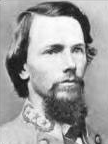 Open main menu
Open main menu
 Open main menu
Open main menu

HEADQUARTERS THIRD BRIGADE,
October 2, 1862.
Captain W. H. SELLERS,
Assistant Adjutant-General.
SIR: I have the honor to report the part taken by my command in the engagements at Sharpsburg, Md., on September 16 and 17.
When the army arrived at the height on the south side of Antietam river on the morning of the 15th, I was ordered to take position about a mile from Sharpsburg, on the Hagerstown turnpike. The right of my brigade rested at Saint Mumma's Church (Dunkers' Chapel), and the line extended along the turnpike in the edge of a wood which bordered it on the southwest. Across the road (on the northeast) was an open field a quarter of mile in width, extending along the whole front of the line and beyond it about 600 yards. This open space was bounded on the northeast (to my front) and northwest (to my left) by woods, an opening being left at the north corner.
Late in the afternoon of the 16th, the enemy's skirmishers advanced into the woods in front of my position. They were held in check by my riflemen and the Texas skirmishers. In the mean time I was ordered by General Hood, commanding the division, to move forward and occupy the edge of the wood in which the skirmishing was going on. This was quickly accomplished, and the enemy was driven, at dark, to the farther side of the wood, toward the Antietam. My brigade was relieved during the night, and moved, with the rest of General Hood's command, to the wood in rear of Saint Mumma's Church (Dunkers' Chapel).
Soon after daylight on the 17th, the attack of the enemy commenced. The battle had lasted about an hour and a half, when I was ordered to move forward into the open field across the turnpike. On reaching the road, I found but few of our troops on the field, and these seemed to be in much confusion, but still opposing the advance of the enemy's dense masses with determination. Throwing the brigade at once into line of battle, facing northward, I gave the order to advance. The Texas Brigade, Colonel Wofford, had in the mean time come into line on my left, and the two brigades now moved forward together. The enemy, who had by this time advanced half-way across the field and had planted a heavy battery at the north end of it, began to give way before us, though in vastly superior force. The Fifth Texas Regiment (which had been sent over to my right) and the Fourth Alabama pushed into the wood in which the skirmishing had taken place the evening previous, and drove the enemy through and beyond it. The other regiments of my command continued steadily to advance in the open ground, driving the enemy in confusion from and beyond his guns. So far, we had been entirely successful and everything promised a decisive victory. It is true that strong support was needed to follow up our success, but this I expected every moment.
At this stage of the battle, a powerful Federal force (ten times our number) of fresh troops was thrown in our front. Our losses up to this time had been very heavy; the troops now confronting the enemy were insufficient to cover properly one-fourth of the line of battle; our ammunition was expended; the men had been fighting long and desperately and were exhausted from want of food and rest. Still, they held their ground, many of them using such ammunition as they could obtain from the bodies of our own and the enemy's dead and wounded. It was evident that this state of affairs could not long continue. No support was at hand. To remain stationary or advance without it would have caused a useless butchery, and I adopted the only alternative-that of falling back to the wood from which I had first advanced. The enemy followed very slowly and cautiously. Under direction of General Hood I reformed my brigade in the rear of Saint Mumma's Church (Dunkers' Chapel), and, together with the Texas Brigade, which had also retired, again confronted the enemy, who seemed to hesitate to enter the wood. During this delay re-enforcements arrived, and the brigade was relieved for the purpose of obtaining ammunition.
At 1 p. m., having been supplied with ammunition, I was again ordered to the field, and took position in the wood near the church. Here the brigade remained, under an incessant cannonade, until near nightfall, when it was moved [one]half mile nearer the town of Sharpsburg, where it lay during the night and the following day.
The good conduct of my brigade in this battle had not been surpassed by it in any previous engagement. Weak and exhausted as they were, and fighting against fearful odds, the troops accomplished and endured all that was within the limits of human capacity.
Our loss in proportion to the numbers engaged was extremely heavy. The officers suffered severely. Colonel Liddell, the gallant and beloved commander of the Eleventh Mississippi Regiment, fell, mortally wounded; Lieutenant-Colonel [S. F.] Butler, of the same regiment, receive a painful wound, and Major [T. S.] Evans was killed. Colonel Stone, Lieutenant-Colonel [D. W.] Humphreys, and Major [J. A.] Blair, of the Second Mississippi, were all wounded while leading that distinguished regiment in the charge. Major Webb, commanding Sixth North Carolina, Captain [S. McD.] Tate, an acting field officer of the same, and Captain [L. H.] Scruggs, commanding Fourth Alabama, received wounds while gallantly discharging their duty.
The members of my staff-Lieutenant Terrell, assistant adjutant-general, Captain Kirkman, Lieutenant Law, of the Citadel Academy, and Private Smith, Fourth Alabama-as usual, performed every duty bravely and efficiently.
I am, Captain, very respectfully,
E. M. LAW,
Colonel, Commanding Brigade.
Source: OFFICIAL RECORDS; Series 1, Volume 19, Part I (Antietam - Serial 27), Pages 937 - 938